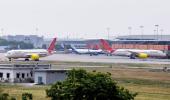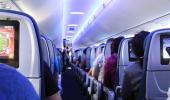'Whoever is doing it (threats to airlines), they are actually carrying out a recce.'
'This is the manner in which terrorists strike.'

Advocate Yeshwant Shenoy, whose public interest litigation revolving around improving safety of India's airports and civil aviation security (pdf file) has been pending in the Bombay high court for almost a decade now for some reason or the other, tells Prasanna D Zore/Rediff.com that the threats received by various airlines -- as many as 100 in about just seven days lately -- should not be treated as hoax calls and immediate measures must be taken to tighten aviation security.
"Always remember, security agencies have to get it right 100 per cent of the times, whereas the bad guys just need one hit from a hundred plots," warns the Ernakulam-based Shenoy who has persistently taken on the civil aviation ministry for improving the safety and security of India's airlines passengers.
What do you make of the bomb threats that airlines in India have been receiving? There have been more than 100 such threats in the last one week alone.
I would look at it very seriously for a very simple reason, that if such threats are being made by individuals, these calls would not have been so focused and concentrated, but would have been isolated.
Someone is testing the security agencies. If there are 100 threat calls made in a span of less than a week, then it could be possible that someone is testing our security protocols.
When you have 50 to 100 such calls made, each one of which turns out to be a hoax, what happens with the security apparatus is that they tend to bring down their guard and then start to go about doing everything as a drill.
When this happens, the people behind it (such hoax calls) identify the weaknesses in the security systems and try to exploit them.
Do you think the agency, the Bureau of Civil Aviation Security, is geared to handle such regular, persistent, threats?
I have my serious doubts. I have myself filed the public interest litigation in the Bombay high court, which is pending now for the last ten years.
Do you remember the situation where one mentally insane person actually was standing right under the aircraft? There was an incident at the Bombay airport (In August 2019, a mentally unstable person climbed over the security wall around the perimeter at Mumbai airport and was caught by the Central Industrial Security Forces personnel near the main runway).
There was this insane person who jumped the fence, walked onto the runway and stood right under the aircraft. Now imagine what a trained terrorist can do? Will it be so difficult to wear a suicide vest and stand there right under the aircraft?
The (CISF) security could not stop a man from actually jumping the fence and reaching the aircraft. It's not a small thing. I had pointed it out specifically in court.
Then the Parliamentary committee pointed out that the parking space inside the terminal is a danger. So when a Parliamentary security committee points that out and nobody else acts on it, then it's a serious issue.
The ATC (air traffic control) tower at the Mumbai airport is the biggest security threat. I pointed that out in my public interest litigation pending in the court.
The Airport Authority of India made the submission in the court that they are considering relocating it to a more secure place, but the fact is that they have not done it yet and it is a serious threat because what security do you have there? Nothing.
What kind of dangers can one face, if these threats are not taken seriously?
Nobody knows much about how terrorists plan and plot. I wouldn't put it (these threats to airlines) only to terrorists, but whoever is doing it, they are actually carrying out a recce. This is the manner in which terrorists strike.
Always remember, security agencies have to get it right 100 per cent of the times, whereas the bad guys just need one hit from a hundred plots.
You take any big terrorist strike and start learning the pattern in which they find out the weaknesses in a system. So once you find under what circumstances a system has not been taken care of, they know that it is a weakness. For example, let me put it this way.
Imagine how sensitive our politicians are to personal security checks at the airports. When they come to the airport, they don't want to go through the security check, bypass the security check.
Now a terrorist organisation can easily use such politicians and compromise national security. Now they will eye out these people who do not go through security as their weak spot. They can threaten their families; do so many things to their families and ensure this man obeys orders. That is why in many countries even the VVIPs do not have exemption from security checks. That is because by giving them exemption, we are actually putting their life at threat too, because they become the weak spot.
In India, we don't have any such consideration. But that is exactly what we need to worry about our VIPs' security. They don't understand that they are putting their own life and their family's life at stake.
Talking about these phone call threats to various airlines, just look at the manner in which phone calls go. These are not focussed and sent to a particular airline. It is at different places. When that kind of thing happens, you have to understand that there's somebody seriously at work.
What security protocols are usually followed in the wake of such bomb threats to airline? And are these protocols being followed?
Normally, these protocols are confidential to the security agencies for obvious reasons. I do not know whether they follow it or not. But certainly they need to be alert, more alert than ever.
Could this be a dry run by somebody planning to do something terrible in India?
I am telling you very clearly, this is a focused plan, it is clear cut, dry run; if I am sitting there (at the head of the Bureau of Civil Aviation Security), I would take it very seriously and increase my security levels.
Have you filed an RTI to find out what security protocols are followed when such threats are received and if the airports, as well as airline companies are following those security protocols?
I have not filed any RTI, but my PIL in the Bombay high court is absolutely clear about one thing. I have without any doubts, categorically stated that Indian airports are sitting ducks. Even airports like Delhi and Mumbai.
And was this PIL heard in the Bombay high court?
It was heard. It was taken very seriously and then suddenly it went into deep freeze.
What happened during the PIL hearings? Could you tell us?
What happens is, with the constant change in bench, there is no continuity. They -- the civil aviation ministry and the Airports Authority of India -- make a submission before the court to relocate the ATC tower in Bombay (Mumbai).
But the very next hearing, there was a change in the Bench and these people (the respondents to the PIL, chiefly the Directorate General of Civil Aviation and the Union of India) do not stick to the submissions made earlier and their submission was not recorded in a judgment. The hearing is back to square one.
But the fact is that the Parliamentary committee on security has pointed out (and recommended) certain things but they have not rectified those. So if they don't act on threats pointed out by a Parliamentary committee, then why would they even care about the pleadings in a PIL?
Could you give us some points which have not been followed after the Parliamentary committee gave its recommendations?
The parking area at Mumbai airport is to be separated from the terminal -- Not followed.
Relocation of the ATC tower -- Not followed.
Duty timing of CISF personnel in Bombay is 12 hours; everywhere else it is 8 hours. The number of personnel required in Mumbai is much higher than available.
Now, the CISF is really, really, stretched out. You cannot expect them to retaliate with vigour because they are tired, they are fatigued. It is as simple as that.
At the Bombay airport, please see, the requirement of CISF, it's too much (and the personnel employed are far less). You're putting too much burden on those (limited number of CISF) personnel (who have been given the charge of airport security in India).
What measures are needed to further tighten airport security as well as aviation security in general?
The very first thing we need to do is to keep this VIP culture at bay.
Then, there are several ways of entry into an airport. The (entry and exit of) personnel running the cargo operations requires a serious overhaul because I strongly believe that corruption is playing a huge role wherein these checks (on cargo personnel who have valid passes to enter and exit cargo terminals located within an airport's premises) are not done.
I have produced (it in the PIL filed in Bombay high court) two security passes issued in the same person's name for the same period for two different agencies. If you can't block these malpractices, how are you even going to check out the entry and exit of these workers themselves?
Airport security's a mess. They are not taking it very seriously. I strongly believe that our airport and aviation system is seriously a threat to national security. If somebody wants to carry out an attack, it's easy. I would put it that way.
Somebody who is willing can do it (breach airport security and launch an attack) easily. It is more about the lack of the will of those people to carry out an attack, than the strength of our security systems to keep them at bay.










